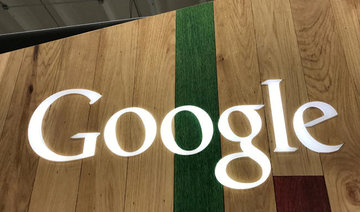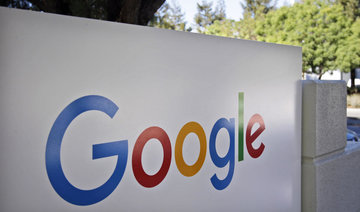DUBAI: Google has announced the introduction of four new measures to curb the spread of terrorist content on YouTube, saying more immediate action needs to be taken to face the challenge posed by such material.
The internet giant, which owns video-sharing site YouTube, said it would take a tougher position on videos containing supremacist or inflammatory religious content by issuing a warning and not monetizing or recommending them for user endorsements, even if they do not clearly violate its policies.
In a blogpost, Kent Walker, senior vice-president and general counsel at Google, said “the threat posed by violence and hate is a critical challenge for us all. Google and YouTube are committed to being part of the solution.
“While we and others have worked for years to identify and remove content that violates our policies, the uncomfortable truth is that we, as an industry, must acknowledge that more needs to be done. Now,” he added.
Walker went on to outline the new measures that will be taken to counter the spread of inflammatory content online.
Firstly, Google will increase its use of technology to help identify extremist and terrorism-related videos.
“This can be challenging: a video of a terrorist attack may be informative news reporting if broadcast by the BBC, or glorification of violence if uploaded in a different context by a different user… We will now devote more engineering resources to apply our most advanced machine learning research to train new ‘content classifiers’ to help us more quickly identify and remove extremist and terrorism-related content,” Walker wrote.
Secondly, “we will greatly increase the number of independent experts in YouTube’s Trusted Flagger program,” Walker noted.
“Machines can help identify problematic videos, but human experts still play a role in nuanced decisions about the line between violent propaganda and religious or newsworthy speech.”
Walker also said a tougher stance would be taken on videos that do not clearly violate Google’s and YouTube’s policies — for example, videos that contain inflammatory religious content.
In the future, “these will appear behind an interstitial warning and they will not be monetized, recommended or eligible for comments or user endorsements. That means these videos will have less engagement and be harder to find.”
Lastly, Google will expand its collaboration with counter-extremist groups to identify content that may be used to radicalize and recruit extremists, it said.
The company will also reach potential Daesh recruits through targeted online advertising and redirect them towards anti-terrorist videos in a bid to change their minds about joining.
— With Reuters
Google debuts new measures to curb extremist videos on YouTube
Google debuts new measures to curb extremist videos on YouTube

KFC Arabia and TBWA\RAAD’s Saudi campaign wins big at TikTok Ad Awards 2025

DUBAI: TikTok announced the winners of the TikTok Ad Awards 2025 at a ceremony held at the King Abdullah Financial District Conference Center in Riyadh on Wednesday, celebrating advertising campaigns on the platform from across the Middle East.
The top honor, G.O.A.T. (“Greatest of All Time”), which celebrates the best overall campaign combining creativity, media performance and proven effectiveness, went to the Saudi campaign “Om Bdr — 12th Ingredient,” developed by TBWA\RAAD for KFC Arabia.
The campaign was born out of Saudi user behavior on TikTok, which saw users dusting a seasoning created by a local cook named Om Bdr onto their KFC chicken. Picking up on this trend, KFC partnered with Om Bdr, adding her seasoning as its unofficial 12th spice.
Instead of focusing on trends or virality, the brand listened to its audience and “made the creator a partner,” said Ahmed Arafa, chief marketing officer at KFC Arabia.
He added: “This campaign was about respecting where the idea came from, crediting the community that discovered it, and turning cultural momentum into something real. Om Bdr’s seasoning belonged on our menu because our customers put it there first.”
The campaign emphasized authenticity, moving away from high-production studio shoots to filming inside actual KFC outlets, with minimal setup and featuring Om Bdr as herself.
As a result, KFC Arabia recorded its highest sales mix to date, while Om Bdr sold out of her own seasoning following the campaign.
“Om Bdr — 12th Ingredient” also won Gold in the Goal Digger category, which celebrates work that delivers measurable results, and Silver in the Community Core category, which highlights campaigns driven by creator and community collaborations.
The two firms also collaborated on another campaign, “Nuggets — Nugg it. Dip it. Crunch it.”, which ran across Saudi Arabia, the UAE and Qatar, and won Bronze in the Sound On category.
The campaign centered on a looping audio track paired with videos focusing on picking, dipping and eating a nugget.
TikTok said the campaign promoted creator participation, with users adapting and reworking the audio in ways that felt native to the platform.
Saudi-based creative agency Habbar’s campaign, “14 Feb: Judgement Day!”, for online gift delivery service Floward, won Silver in the Goal Digger category.
The campaign took a humor-led approach to reflect the pressure and last-minute decision-making often associated with Valentine’s Day gifting, using creator collaborations and video formats designed to encourage sharing and commenting.
Other notable campaigns included “My Like First” by Lux, which ran in Saudi Arabia and the UAE and won Gold in the Community Core category, as well as “How I Crunch It” by Bugles, created by MRM and UM, which won Bronze in the Sound On category.
“The Ad Awards winners of this year show what’s possible when brands embrace TikTok not just as a media platform, but as a creative canvas,” said Shadi Kandil, general manager of global business solutions for the Middle East, Turkiye, Africa, Central and South Asia at TikTok.














